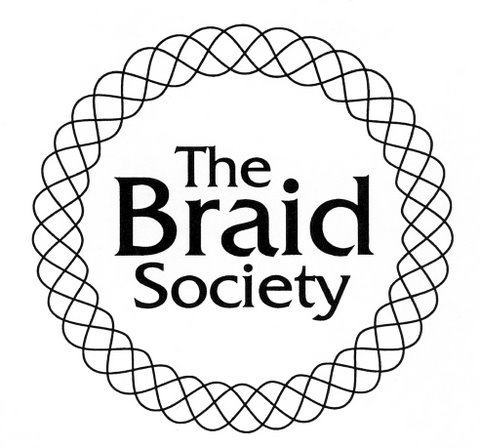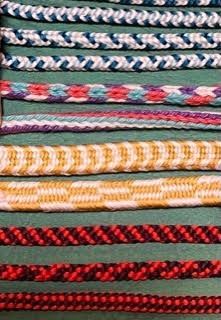| Members can log in by clicking on icon to the right |
|
Nordic and world braids and bands 2022
TECHNIQUES - KUMIHIMO
Plan ahead! Design beginnings and endings for your braided creations from a library of techniques. You will end the day with a clutch of samples and a head full of ideas. Start: blunt end, looped beginning, start on a button or a do-nut Stop: butt-and-bead, embellished knots and fringes, loop and beads, peyote stitch. Make a Nifty Necklace in class (the length you really want!) Suggestions included for trimmings, bag handles and curtain tiebacks. All skill levels welcome. Each student brings: scissors, pen/pencil, braid samples if desired Materials fee: 150 Dkr. This fee includes two braiding discs, workshop booklet, beads, needles, fancy yarns, buttons, plastic tubing, glue
|
Workshop Cancelled In this taster session for beginners, you will learn how to set up a marudai with bobbins, warp and counter-weights, and will create a two colour 8-strand braid with up to three different patterns (square, flat and spiral). Depending on the length of your braid at the end of the session you will be able to add findings and turn it into a key fob, bracelet, glasses cord, necklace or lanyard. Alternatively, you could transfer it to a foam disk and continue braiding. Many Kumihimo braids can be done on a foam disk but most are quicker, easier and more even when made on a marudai, as you can use both hands at the same time and the tension is controlled by the weighted bobbins and counter-weights. Illustrated instructions and pre-cut warps will be provided and you will have the use of a marudai, 8 tama (bobbins), a weight bag with counterweights, an S-hook and a chopstick. Kumihimo findings (key rings, cord ends, bracelet, necklace and lanyard fastenings) will be available to purchase. Foam disks, EZ-bobs and additional pre-cut warps will also be available for purchase for those wishing to continue with their braid, and/or make another, after the session. Each student brings: A notepad, pen/pencil, scissors Materials fee: 25 Dkr. This fee includes a pre-cut warp, fine cotton for whipping the ends of the braid, an illustrated instruction sheet, glue. |
Participants will make a variety of samples of narrow and wide braids using many techniques. Those who are relative beginners will create basic braids, mainly using free techniques, on the Kumihimo disk or Marudai. Advanced students many choose any technique whatever (through prior consultation with the tutor) and be guided to new levels. Students with or without equipment are acceptable. All levels. Each student brings: Kumihimo equipment if already owned: Marudai, Kakudai, Ayatakedai, Takadai, Karakumidai. There will be no large equipment for hire but it may be possible to hire a marudai and tama. Kumihimo Disk and plate, bobbins, scissors and note taking materials. Braiding materials if already owned. Materials fee: Participants may bring their own prepared materials, or purchase and use from the following items that I will bring from Japan: silk (180 DKK), metallic thread (160 Dkk), kumihimo disk (30 DKK), kumihimo plate (30 DKK), OCTO plate (45 DKK). I will be able to bring copies of my books with me upon request.
|
Students will learn how to make a variety of textured braids on the octo plate, a new variation of the foam disk allowing for new types of braids including curved, twisted, serpentine, flat and wide. These unconventional braid styles have many design possibilities, including contemporary jewelry and edging on clothing or fabric. Students will learn how to achieve different textures using a variety of braiding materials. A great class for beginners and advanced students new to the octo plate. Each student brings: If attendees want to make a jewelry during the class, please bring a chopstick, masking tape, fine cotton threads to tie braiding threads and light bobbins such as EZ Bobs (24 bobbins for one piece of jewelry) if you have them. Materials fee: 150 Dkr. This fee includes 2 octo plates and thread for sample making. If attendees want to make a jewelry during the class, Japanese metallic threads, findings, and EZ Bobs can be purchased in class. |
One of the most exciting things about braiding is the way a few coloured threads can be rearranged and hey presto! - an entirely different design appears. This workshop will help you to understand how colour placement works for different popular braid structures so that you can create a variety of designs. Although the focus will be on Japanese braids, you will also try simple Andean braids in order to compare how the different working movements lead to different surface patterns. You'll get to experiment and make small samples of several designs to take home. You should be familiar with the basics of setting up and using a marudai for this class Each student brings: Marudai, 24 or 16 weighted bobbins; counterweight, scissors, sewing thread and needle. Notebook, pencil, at least four different coloured pencils/felt tips. Box or stool to place marudai on, unless you are happy to work standing up or kneel on the floor. Marudai and tama will be available to borrow if you don't have your own. Materials fee: About 120-140 Dkr. this fee includes Japanese kumihimo silk and other threads to make the samples. |
For all levels. Whether you are a beginner about to start your marudai journey or an intermediate braider looking to hone your existing skills, this workshop will help you navigate kumihimo on the marudai, from what all those Japanese words really mean (and how to pronounce them) to tips and tricks for improving your braiding that you won’t find in books. The day will also cover how to prepare silk threads and follow patterns from different braiding schools, how to move the bobbins and to understand the basics of key braid structures and colour placement. You will make small samples of several designs to take home. You should finish the day able to braid better, faster and with more confidence – as well as having had fun! Each student brings: Marudai, 16 weighted bobbins (preferable) or minimum of 8; counterweight, scissors, sewing thread and needle. Notebook, pencil, at least four different coloured pencils/felt tips. Box or stool to place marudai on, unless you are happy to place it on a table and stand up for the practical part. Marudai and tama may be available to borrow, rent, or purchase.
Materials fee: About 120-140 Dkr. this fee includes Japanese kumihimo silk and other threads to make all the samples required. |
This is an enjoyable maru-dai class to create new braids by adding 4 bobbins to traditional 8-bobbin techniques. After a short lecture about how to braid basic 8-bobbin techniques like Edo-yatsu, Yatsue, Hira-yatsu, Kara-yatsu and how to make changes with additional 4 bobbins, the participants try to create original braids Each student brings: Maru-dai, 12 tama, counterweight & bag, chopstick, scissors. Note: Threads are included in the class materials. But if you would like to use your favorite ones, please bring own threads for 12 tama (3 colors x 4 strands). Marudai can be borrowed or rented if you are unable to bring one. Materials fee: 100 Dkr. This fee includes handout, threads, magnetic clasps |


